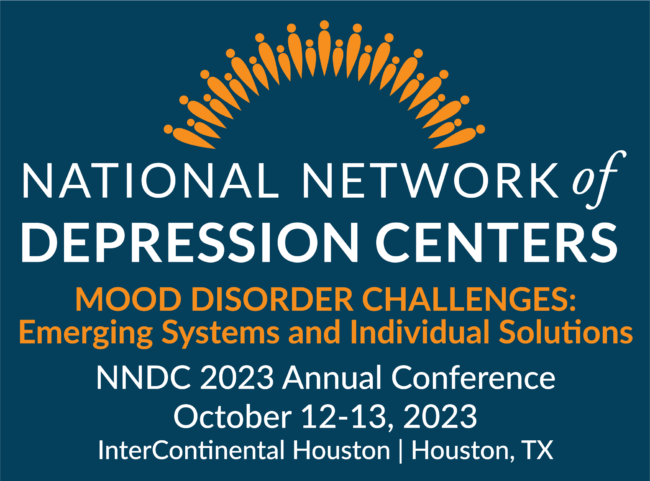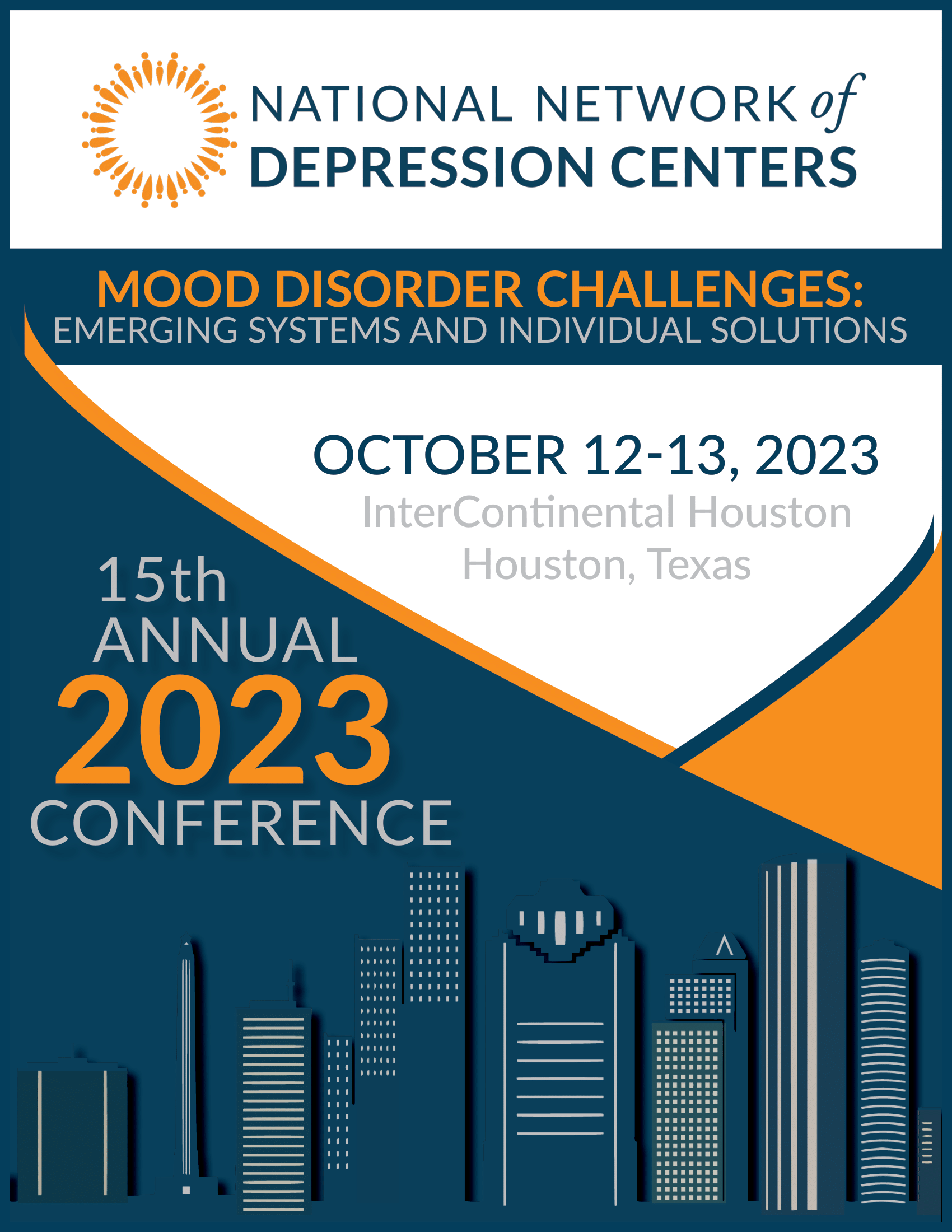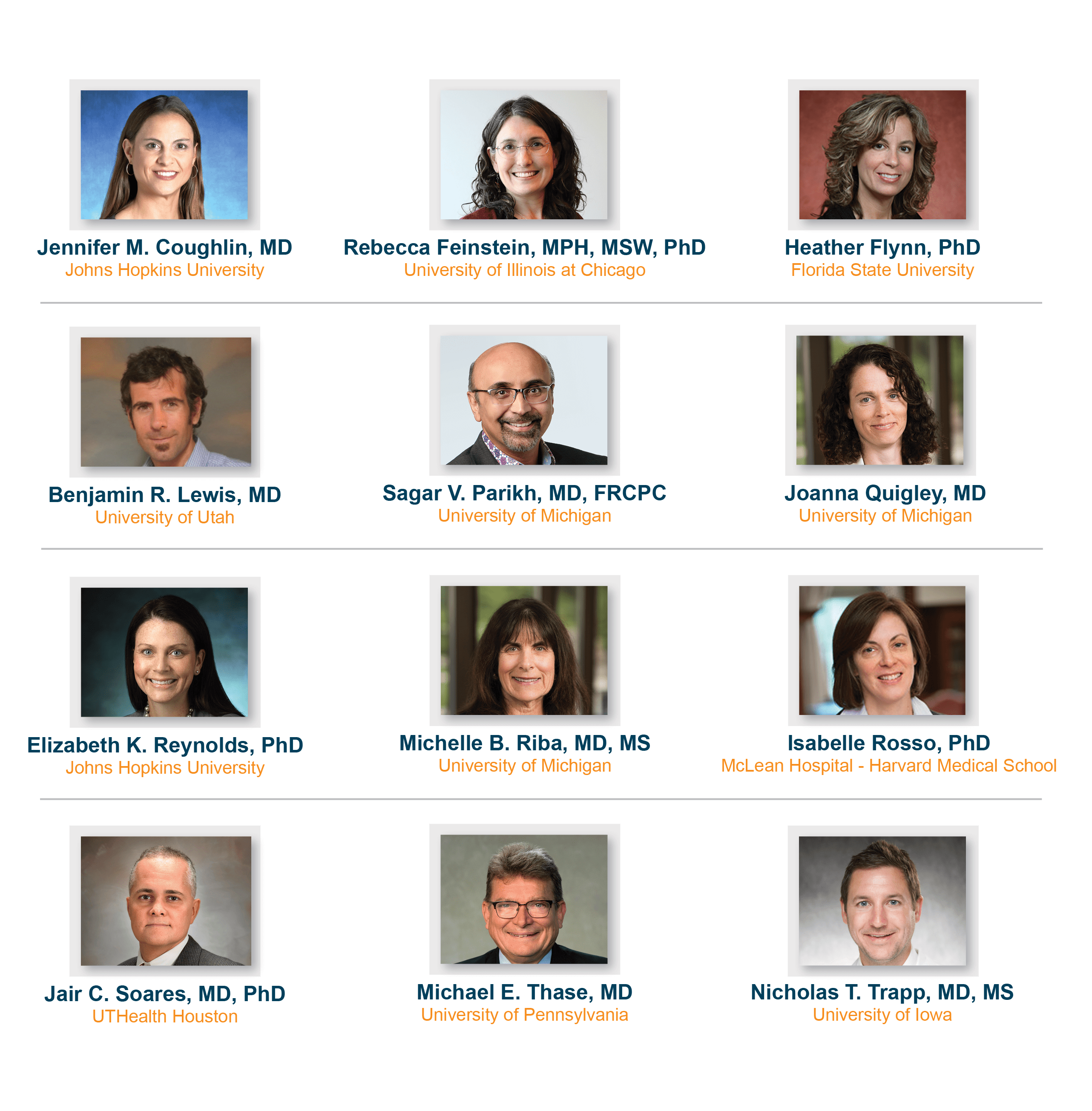ANNUAL CONFERENCE
NNDC 2023 Annual Conference
October 12-14, 2023
InterContinental Houston
Houston, Texas
NNDC 2023 ANNUAL CONFERENCE
The National Network of Depression Centers (NNDC) held its 15th Annual Conference at the InterContinental Houston in Houston, Texas from October 12-14, 2023 with co-host UTHealth Houston 2023 Mood Disorders Conference. The NNDC theme this year was ‘Mood Disorder Challenges: Emerging Systems and Individual Solutions’.
The conference was structured a little differently this year with two full NNDC 2023 Annual Conference days and one day for the UTHealth Houston 2023 Mood Disorders Conference.
Thursday, October 12th was reserved for NNDC business meetings. All attendees were welcome to attend the evening reception from 6:00-8:00pm.
Sessions on Friday, October 13th were dedicated to NNDC academic research topics. Our agenda was carefully crafted to represent interesting, diverse subjects from around 10 NNDC member institutions. Featured sessions explored improving access for children, non-traditional treatments, technology and depression, and other hot topics in psychiatry. Michael E. Thase, MD, University of Pennsylvania delivered a plenary talk on novel and emerging antidepressant medications. Opportunities for attendees to connect with one another included a poster session, a networking happy hour, and a dinner & awards ceremony.
The UTHealth Houston 2023 Mood Disorders Conference took place on Saturday, October 14, 2023 with clinical focus sessions featuring notable speakers from NNDC member sites. The first half of the UTHealth Houston agenda included a plenary talk about the latest depression guidelines by NNDC Medical Director Sagar Parikh, MD from University of Michigan Eisenberg Family Depression Center, followed by sessions on depression through the lifespan – children and adolescents, college students, and the elderly; The second half focused on treatments for major depressive disorders – ketamine/esketamine, neuromodulation, and psychotherapy.
Sessions on both days were eligible for Continuing Medical Education (CME) credits. The NNDC sessions on Friday, October 13th offered 7.75 CME credit hours.
Our goal was to bring leading experts from across the Network and around the world together to learn, discuss, and explore opportunities to collaborate on initiatives designed to improve outcomes for people suffering from depression and related mood disorders. Through merging the NNDC and UTHealth Houston conferences, our hope was to provide a platform for researchers and practitioners to connect and gain insight into one another’s fields while exploring effective solutions for optimal care.
The NNDC would like to thank conference chair Dr. Sagar Parikh, the Program Committee, and all of the sponsors, presenters, and facilitators who helped make this year’s conference as memorable as the last!
Stay tuned for future conference information, and make sure to subscribe to the NNDC monthly newsletter so you can receive breaking network news delivered right to your mailbox!
UTHealth Houston
UTHealth Houston Psychiatry consists of the Louis A. Faillace, MD, Department of Psychiatry and Behavioral Sciences, UTHealth HCPC, the John S. Dunn Behavioral Sciences Center, and several clinics in the greater Houston area.
The Louis A. Faillace, MD, Department of Psychiatry and Behavioral Sciences’ mission follows three pillars: education, research, and patient care. Each year, the department trains students, residents, and the fellows of today to become the mental health care leaders of tomorrow – whether in public or private sectors, in solo or group practice, as researchers, educators, or clinicians. Training totals more than 1,650 students and 175,000 hours of education annually, including specialties in psychiatry, psychology, mental health nursing, and social work.
The faculty and staff are at the forefront of the exploration of the causes and treatments of mental illnesses. They generate more than $6 million annually in grant-supported research. Specific areas of research include mood and anxiety disorders, trauma and grief, childhood disorders, and addiction, with new programs in post-traumatic stress, integrated clinical neuroscience and treatment, early diagnosis & intervention, biochemical markers, psychiatric genetics, and geriatric psychiatry. The UTHealth Houston psychiatry department faculty members’ wide variety of expertise covers the full spectrum of behavioral disorders, supporting research they pursue in conjunction with their clinical and educational contributions to the department.
UTHealth Houston is expanding its psychiatry department. With the opening of the new John S. Dunn Behavioral Sciences Center combined with UTHealth Houston Harris County Psychiatric Center, the Dunn Behavioral Sciences Campus was formed. Harris County and Houston, TX now boasts the largest psychiatric hospital in the country with 538 beds. With the expansion, UTHealth Houston now serves 29 counties in the surrounding Houston area. Recently, approval came to open up the UTHealth Houston School for Behavioral Sciences.
Learn more at UTHealth Houston
View session details for Saturday, October 14, 2023 for the UTHealth Houston 2023 Mood Disorders Conference.
POSTER SESSION
The 15th Annual NNDC Annual Conference was held from October 12-13, 2023 – and we were excited to see up to 50 posters in Houston, Texas! The Poster Session will took place from 12:45-2:00pm CT on Friday, October 13th with posters on display the entire day and an awards ceremony in the evening.
The Conference Program Committee welcomed all conference attendees to submit a poster related to depression and bipolar illnesses, particularly those that fit the NNDC conference theme – Mood Disorder Challenges: Emerging Systems and Individual Solutions.
Only one poster per individual was accepted. Posters were submitted to one of two categories:
- Basic Science
- All areas of research were welcome, but posters dealing with approaches (both biological and psychosocial) to understanding mood disorders, new or repurposed treatments and technologies, monitoring strategies with the potential to improve patient outcomes, or objective measures like biometrics, neuroimaging, bloodwork, or genetics were encouraged.
- Clinical Programs
- Unified efforts are the best way to expedite technological innovation, dissemination of new information, and translation of research into clinical practice. Posters in this category showcased multidisciplinary programs, demonstrate the efficacy of collaborations beyond academic boundaries, or deal with clinical assessments like patient questionnaires, clinical diagnoses, or clinical interviews.
There were a total of four poster awards given: Best Overall – Clinical Programs, Best Overall – Basic Science, Best Emerging Scholar – Clinical Programs, and Best Emerging Scholar – Basic Science. “Emerging Scholars” are graduate students, fellows, post-doctoral fellows, residents, or early career faculty within five years of fellowship or post-graduate appointment at a Center of Excellence or an Associate Member institution.
Congratulations to the following poster presenters who received an award:
- Best Overall – Clinical Programs: Emily Grace Baxi, PhD, Breakthrough Discoveries for Thriving with Bipolar Disorder (BD2)
- Best Overall – Basic Science: Brian J. Mickey, MD, PhD, University of Utah
- Best Emerging Scholar – Clinical Programs: Kathleen Watson, PhD, Stanford University
- Best Emerging Scholar – Basic Science: Bianca Nina De, BSE, University of Florida
SPONSORS
Thank you to the following sponsors for supporting the NNDC 2023 Annual Conference!
SPONSORSHIP OPPORTUNITIES
This conference featured the signature blend of biological, psycho-social, and systems-level programming that sets the NNDC Annual Conference apart from other major psychiatric CME events. This year’s event was hosted in partnership with the University of Texas Health Science Center at Houston’s annual Mood Disorders Conference, and featured a unique blend of traditional NNDC research-oriented sessions and more clinically-focused lectures from our Houston partners. Sponsors at all levels were encouraged to attend our sessions and participate in discussion with our members.
As is typical of our conference, we built in lots of breaks to give our members ample face-to-face networking time. These networking breaks were great opportunities for our sponsors to renew relationships with renowned clinicians, researchers, and academic leaders. Breaks were a little bit longer than normal this year, too, to give attendees some extra time to reconnect.
Below is an outline of available sponsorship opportunities. All opportunities are tax-deductible as the NNDC is a registered 501 (c) (3) non-profit.
Gold Level
This premier level sponsorship provides exclusive opportunities to engage with NNDC members. If you are looking to maximize your presence before, after, and during the conference while building close relationships with NNDC members, including leadership, this is the best option for you.
Silver Level
This Sponsorship level provides high level branding awareness, a strong conference presence with three tickets included, and one poster during the poster session. The Silver Level works well for industry partners looking for an overall heightened conference presence who don’t need scheduled face-to-face time with NNDC leadership.
Bronze Level
This sponsorship level provides strong digital marketing presence along with an on-site presence and plenty of networking opportunities as conference participants.
The NNDC staff is happy to work with you to create a sponsorship package that works for you and your team. To learn more about the above sponsorship levels, and to inquire about available packages and alternate opportunities for future events, please contact Shilpa Kharecha at [email protected].



